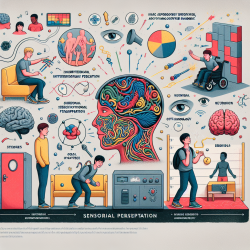As Special Education Directors, our primary goal is to ensure that all children, regardless of their challenges, receive an education that is tailored to their unique needs. This is especially true for children with mental handicaps, where speech and language intervention becomes a critical component of their educational program. Drawing on recent research, this blog post aims to provide practitioners with insights and strategies to enhance their speech and language intervention programs for mentally handicapped children.
Research highlighted in the article "What factors and clinical impressions influence your speech and language intervention program for mentally handicapped children?" suggests that a multi-faceted approach, which includes understanding the child's strengths and weaknesses, is essential for effective intervention. The study underlines the importance of not only assessing the child's speech and language capabilities but also considering additional complications such as hearing loss, visual handicaps, and emotional or behavioral problems.
Key Insights from the Research:
- Team Collaboration: One of the most significant roles for speech and language specialists is to work collaboratively with a professional team. Sharing information and insights about the child's capabilities and challenges can lead to a more comprehensive and effective intervention plan.
- Parental Communication: Communicating effectively with the parents of the child is paramount. Many parents may not fully understand their child's challenges, and it's crucial to communicate the child's needs and the rationale behind the intervention strategies being employed.
- Program Adaptation: The research emphasizes the need for modification of speech and language programs based on the child's individual needs. This may involve prioritizing certain areas of intervention over others, based on the child's strengths and weaknesses.
- Importance of Sensory-Motor Integration: For some children, especially those with profound handicaps, programs that focus on sensori-motor integration have been shown to be beneficial. These programs aim to accelerate brain development and organization, which can, in turn, facilitate better communication skills.
Implementing the Outcomes:
To implement the outcomes of this research, practitioners should consider the following strategies:
- Conduct comprehensive assessments that go beyond speech and language, to include sensory and motor skills, hearing, and vision.
- Engage in regular communication with parents and caregivers, providing them with updates and involving them in the intervention process.
- Customize intervention programs to meet the unique needs of each child, considering their strengths and potential barriers to learning.
- Incorporate sensory-motor integration activities into the intervention plan, especially for children with profound handicaps.
By adopting a holistic and collaborative approach to speech and language intervention, practitioners can significantly improve the outcomes for mentally handicapped children. It is through understanding the individual child, engaging with their support system, and tailoring intervention strategies that we can make a meaningful difference in their lives.
For practitioners looking to deepen their understanding and refine their approach to speech and language intervention for mentally handicapped children, further research and continuous professional development are recommended. Embracing new insights and methodologies will not only enhance our skills as educators but also ensure that we provide the best possible support to the children in our care.
To read the original research paper, please follow this link: What factors and clinical impressions influence your speech and language intervention program for mentally handicapped children?










